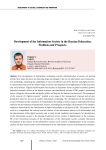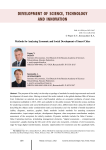Development of science, technology and innovation. Рубрика в журнале - Economic and Social Changes: Facts, Trends, Forecast

Development of the information society in the Russian Federation: problems and prospects
Статья научная
He development of information technology and the informatization of society are putting forward new tasks that focus on obtaining major advantages in the use of information and communication technology, expanding the capabilities of users and effective use of the Internet and digital services. A characteristic feature of the modern stage of society’s development is the digitalization of the economic and social spheres. Digital transformation has become an important factor in global economic growth: potential economic effects of the digital economy can significantly increase GDP, people’s purchasing power, change the labor market and quality of life, and improve the business environment. The emergence of the concept of “digital economy” marked a new stage in the management of goods and services production based on the use of modern information technology. The development of the information society in Russia and the reduction of its lag behind the leading countries requires addressing the issues related to the development of intellectual, human, technological advantages; the formation of an adaptive regulatory framework for the introduction of digital technologies in all spheres of life. The purpose of the work is to comprehend the concept and the essence of the information society in its relationship with the phenomenon of the digital economy and to study trends, problems and prospects for development of the information society in the Russian Federation in the context of digitalization of the economy. We review theoretical concepts of the development of the information society, consider theoretical foundations of the essence of the information society in the context of digitalization of the economy, analyze the state of and trends in the development of the information society in the Russian Federation, and reveal problems and directions of its development. Scientific novelty and originality are as follows: we develop theoretical and methodological approaches to studying the essence of the information society in the conditions of digitalization of the economy and the corresponding conceptual apparatus; we define scientific and methodological foundations for a comprehensive assessment of the situation and trends in the development of the information society in the Russian Federation; we propose a range of practical measures and a list of indicators characterizing the development of the information society.
Бесплатно

Methods for analyzing economic and social development of smart cities
Статья научная
The purpose of the study is to develop a typology of methods for analyzing economic and social development of smart cities. Having reviewed the works indexed in the global database Web of Science Core Collection we selected one and a half hundred articles on economic problems of smart cities development published in 2015-2021 and available in the public domain. We identify various methods for analyzing economic and social development of smart cities, differentiate them using the method of describing the objects under consideration (static and dynamic) and the method of model description (tables, diagrams, matrices, graphs). Static methods include methods for assessing ecosystem characteristics, input-output analysis, development diagrams, data ecosystems coordination analysis, assessment of the ecosystem for elderly residents. Dynamic methods include the Value Creation - Value Capturing matrices, stimulating management elements, “digital ecosystems - entrepreneurial ecosystems”, graphs showing the life cycle of the smart city ecosystem, evolution of civil ecosystems, stage-by-stage digital transformation, dynamic opportunities for innovation and the quadruple helix. We show the applicability of methods for analyzing the development of smart cities for various territories. We present our own results of assessment of the development of smart cities in Moscow, Yekaterinburg, Oslo, Singapore based on the 7I-model (infrastructure, institutions, intranet, integration, interfaces, innovations, implementation). Theoretical significance of the results obtained consists in the development of a theory of ecosystem analysis related to assessing the formation of smart cities; practical significance of the results lies in the development of applied tools for strategic planning in the field of smart city project development.
Бесплатно

